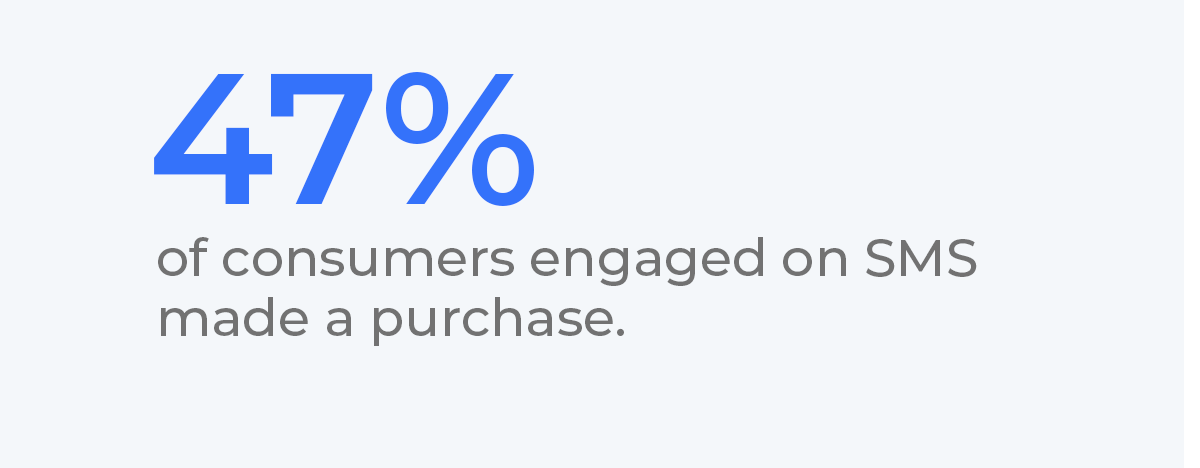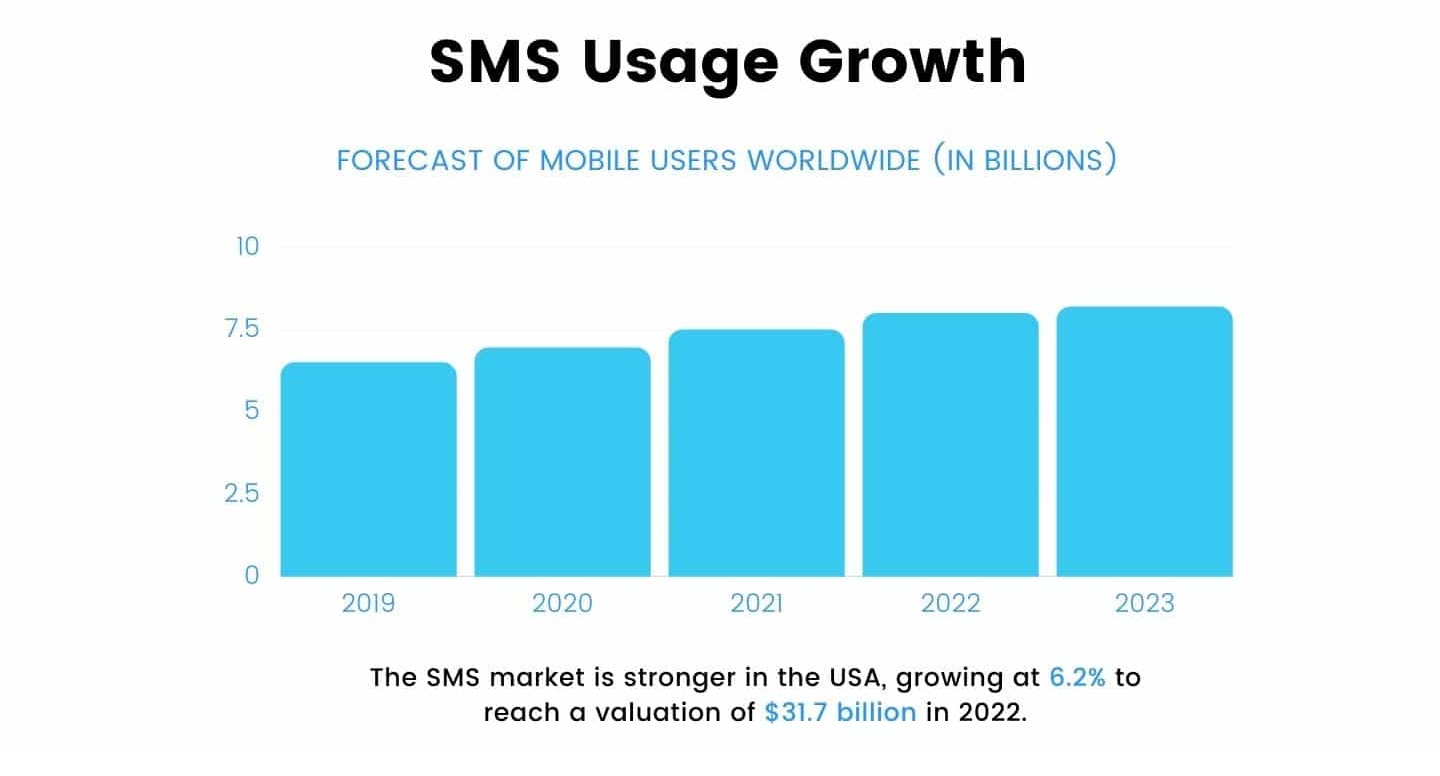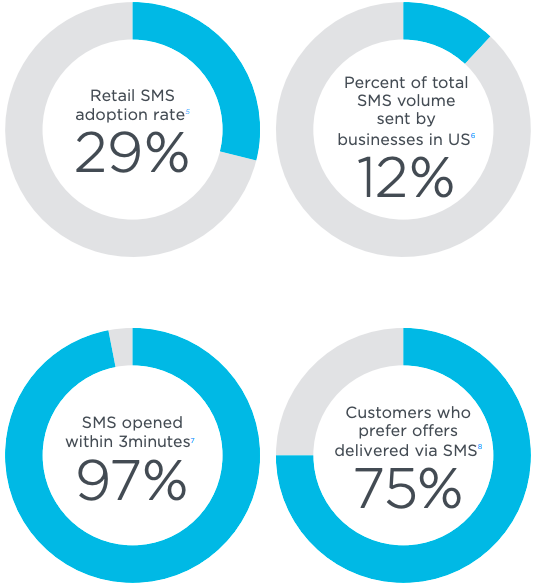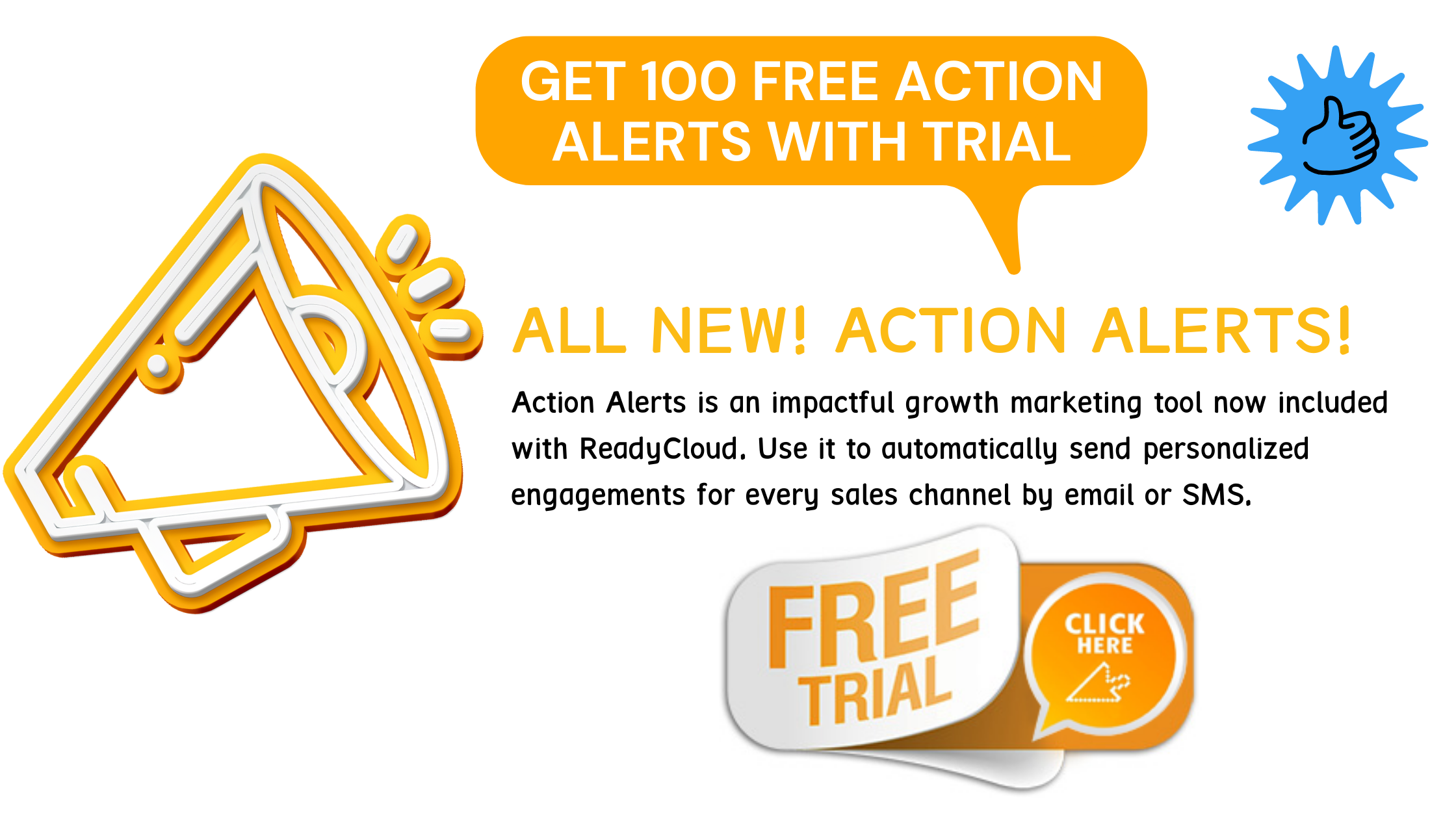Is SMS Marketing for Growth Effective? These Metrics Paint the Full Picture

Research suggests that by the end of 2020, 48.7 million consumers willingly opted-in to receive SMS messages from some of their favorite brands. Even more interesting? 47% of consumers who opened an SMS email marketing message later went on to make a purchase afterward.

SMS marketing, which stands for short message service marketing, refers to the use of text messages to communicate promotional offers and updates to customers. It is an effective tool for time-sensitive offers, such as special discounts, sales, seasonal offers, and more, and should definitely be one of the digital marketing strategies for ecommerce that’s in your playbook.
Read on to learn more.
Did you know that ReadyCloud comes with SMS and Email Growth Marketing Built-in?
Use Action Alerts to keep your customers updated about their order, a delivery, a return label acceptance scan and more. Remarket with Action Alerts to cross-promote and upsell new products and to keep your brand in sight. Each ReadyCloud CRM user license comes with 100 FREE Action Alerts you can use to grow your business each month. Start for free today, no credit card is needed.
Benefits of SMS Marketing
The two obvious reasons why businesses use SMS marketing are the higher than average open rate, as well as conversion rate. Other benefits that make SMS a popular and effective marketing tool include the following.
- Cost-Effective – Like email marketing, SMS marketing is one of the cheapest forms of marketing as it costs very little to send a text. It also does not need to be sponsored like social media campaigns, for example, to get the best reach and response.
- Higher Reach – SMS marketing reaches a large cross-section of consumers because almost everyone owns a mobile device. As popular as social media is, many platforms are a generational appeal. That is not the case with mobile devices, particularly smartphones. The speed to reach consumers is also significantly faster with SMS Marketing. Because most individuals’ mobile phones are attached to them, they can receive an SMS message immediately.
- Personalized – SMS marketing typically requires customers to voluntarily opt-in to receive messages. Research shows that 31% of consumers will respond to a survey via SMS. That means companies get a lot of customer information that helps personalize their brand messages to the consumer.
- Increases Customer Engagement and Loyalty – Text messages are a more personal form of communication that allows consumers to view brands as more accessible and feel more engaged with them. That increased engagement can eventually lead to increased trust and loyalty.
- Compatible with Other Channels – SMS marketing works well as part of a marketing mix and is often a great complement to marketing channels. For example, companies can use SMS to remind consumers to register for a webinar that was promoted across social media.
- Provides Strong Insights – Companies can track various meaningful data via SMS marketing, including customer demographic and behavior. That type of business analytics allows for more effective data-driven marketing decisions.
SMS Marketing Statistics
Companies and brands are increasingly drawn to SMS marketing because the numbers don’t lie. Research has proven the ever-increasing effectiveness of the marketing method. The SMS market will be valued at more than $31 billion by 2022, with healthy year-over-year growth of more than 6.2%.

Take a look for yourself at these recent ecommerce SMS marketing statistics we’ve compiled.
- Text marketing is incredibly effective, with SMS open rates as high as 98%. (Source)
- SMS marketing click-through rates for e-commerce brands can be as high as 36%. (Source)
- SMS messaging is one of the fastest ways to reach consumers directly. 60% of consumers say they read a text within 5 minutes of receiving it. (Source)
- 33% of SMS recipients react to CTAs in SMS marketing messages, and 47% of those end up making a purchase. (Source)
- 98% of Sent Text Messages are Read. (Source)
- SMS messages have a 209% higher response rate than phone, email, or Facebook. (Source)
- It only takes 90 seconds on average for a person to respond to a text message. (Source)
- 90% of SMS messages are read within 3 minutes of being received. (Source)
- Furthermore, 95% of texts that are read and responded to happen within 3 minutes of delivery. (Source)
- As of 2021, 67 million Americans redeem coupons via mobile phones. (Source)
SMS Marketing vs. Email Marketing
There are many similarities between SMS and email marketing. Both are cost-effective, which means they both produce high ROI, the marketing messages tend to be more personalized, and consumers more engaged as it allows for one-on-one interaction.
One is not necessarily better than the other. However, statistically, SMS is winning the battle. The chart below paints the whole picture: SMS has a 98% open rate versus just 22% for email.

Here are some even more interesting statistics on SMS marketing vs. email marketing that you should be aware of:
- SMS marketing click-through rates can be anywhere from 10-15% higher than email marketing campaigns. (Source)
- Consumers are 4.5x more likely to reply to an SMS marketing message than a marketing email. (Source)
- 85% of consumers prefer to receive an SMS to a voice call or an email. (Source)
- 66% of consumers either prefer mobile messaging or consider it their second choice for communications when compared to phone and email. (Source)
- Consumers are 134% more likely to respond to a text than an email, and 86% of businesses using texting find it generates higher engagement than email. (Source)
- The average open rate for text message marketing campaigns is 98%, compared to a 20% open rate for email marketing campaigns. (Source)
A significant reason for SMS success over email is that many email marketing messages end up in consumers’ spam folder, which means they never see it. And when it does reach their inbox, without a strong subject line, many consumers will view a marketing message as spam and delete it accordingly.
Crafting effective email marketing messages require a lot more specific elements than an SMS marketing message, as outlined in a related guide we’ve written: These Email Marketing Statistics Prove This Niche is Very Much Alive.
Current SMS Marketing Trends
As the numbers show, SMS marketing is unquestionably an effective growth method. However, as technology and consumer habits, and demographics, evolve, so too do marketing trends. The following are the current SMS marketing trends marketers should pay attention to in the foreseeable future.
- Continued Increase of SMS Marketing Adoption – Despite the overwhelming proof of its effectiveness, many companies have remained wary of investing in SMS marketing. According to research, 61% of marketers still don’t use SMS marketing. However, all signs point to this steadily changing over time. Research suggests that global spending on SMS marketing will increase to $83 billion by 2024 from $57 billion in 2015.
- Integration of SMS and Influencer Marketing – Influencer marketing has grown into a billion-dollar industry in the last decade. It was only a matter of time before SMS marketing became another channel for it. Despite its popularity, one of the main challenges of influencer marketing is the inability to accurately measure its ROI. SMS marketing makes it significantly easier to measure the ROI of an influencer campaign.
- Greater Adoption of SMS to Improve Customer Service – A 2018 research study found that 70% of customers chose the “message us” button over the “call us” option. Another study found that 90% of customers preferred to receive texts from a company rather than phone calls. It proves that most customers prefer messaging companies versus talking on the phone, likely due to long call wait times. That fact will understandably lead to many businesses adopting SMS marketing to improve customer service.
- Increased Adoption by Other Industries – The retail and e-commerce industries were some of the earliest adopters of SMS marketing and are still the top implementers. However, in recent years, other industries have recognized the effectiveness of SMS marketing and began incorporating it into their marketing mix. That trend is likely to continue.
- Greater Personalization – Research shows that 72% of customers will only interact with personalized messages. That means personalization remains an essential factor in the success of SMS marketing promotions. As a result, businesses will continue to leverage all insights gathered from their SMS marketing promotions to personalize future messages.
Types of SMS Marketing
SMS marketing promotions come in various forms. The right choice ultimately depends on the goal and objectives of your campaign. The following are the most common types of SMS marketing promotions.

- Text Promotions – Text promotions are typically time-sensitive messages offering a special deal or discount to customers. They are perhaps the most common type of SMS marketing promotion.
- Loyalty Programs – Research shows that 75% of consumers would actively engage with loyalty programs if they are mobile available. With that number in mind, it makes sense that companies now offer loyalty program discounts and free offers via SMS.
- Coupons – Coupons are one of the most common types of SMS marketing promotions. Similar to regular coupons, SMS coupons offer special discounts to the user when redeemed. SMS coupons often are used to drive traffic to the company’s website or the company’s brick and mortar stores.
- Text-to-Win Promotions – As the name suggests, text-to-win promotions requires users to text a code, number, or response for the chance to win a specific prize. Winners often get chosen randomly.
- Alerts & Notifications – Possibly as popular as text promotions, many businesses use SMS marketing for sending company alerts and various notifications. For example, alternate opening hours, special business closures, emergency alerts in the case of a natural disaster, and more. That is common for non-commercial industries, such as nonprofits, government agencies, etc.
SMS Marketing Benchmarks
The effectiveness of SMS marketing for any company depends on how it positively impacts its ROI. Measuring this requires specific benchmarks and metrics. These are the essential metrics for establishing the success of your next SMS marketing promotion.

- Conversion Rate – The most relevant metric, conversion rate measures how many users not only clicked on your message but took the action steps required of them. For example, how many responded to a prompt, clicked the link to download a coupon, etc.
- Click-Through Rates – Click-through rate is an important metric if you are aiming to drive traffic to somewhere else. In other words, if the goal of your SMS marketing message was to get users to click a link and drive traffic to your website.
- Number of Opt-Out versus Opt-In – There are always some customers who, after initially opting in to receive messages, change their minds and opt-out. That can be due to various reasons. However, what is concerning for any business is if the rate of opting-out exceeds those opting-in.
- Average Response Time – Customers responding within 5-10 minutes of receiving an SMS message suggests a highly engaged audience. As noted above, 90% of SMS messages get read within 3 minutes of being received. The lower the average response time for a company’s SMS marketing messages, the better.
- Total Number of Subscribers – Along with conversion rate, this is perhaps the most relevant metric. No matter how appealing your SMS marketing promotions are, it doesn’t matter if most of your customers aren’t receiving them. Much like email marketing, your SMS subscriber list is essential. Ensure that you are periodically reviewing it to ensure that numbers are still working and other relevant information is still accurate.
SMS marketing is one of the most effective forms of marketing without the high cost of implementation that comes with others. As consumers continue to depend on their mobile devices for various everyday activities, the power of SMS marketing will only continue to increase.
Email & SMS Marketing For Your Online Store
Use Action Alerts ecommerce email and SMS marketing to keep your customers updated about their order, a delivery, a return label acceptance scan and more. Remarket with Action Alerts to cross-promote and upsell new products and to keep your brand in sight. Each ReadyCloud CRM user license comes with 100 FREE Action Alerts you can use to grow your business each month. Start for free today, no credit card is needed.
Share On:








